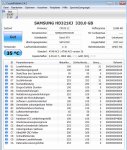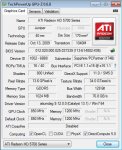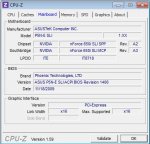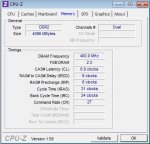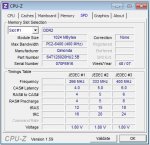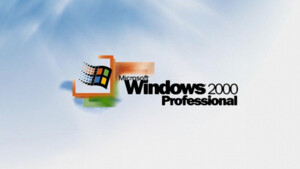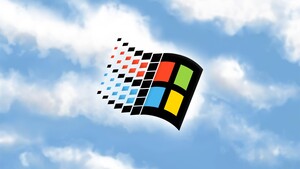Roland0815
Cadet 1st Year
- Registriert
- März 2013
- Beiträge
- 11
Guten Abend,
ich bekomme in sehr unregelmäßigen Abständen immer wieder BS.
Der PC ist schon älter und das Problem auch.
Komisch ist, dass es manchmal 5 mal hinter einander beim booten passiert, manchmal nach 2 Minuten im Firefox und manchmal gar nicht. Wenn es ein Windows Update gibt, dann ist es auch ein paar Tage "besser" bevor es dann wieder zu einer BS Orgie kommt.
Ich hatte den PC schon im Fachhandel abgegeben und um eine Fehlersuche gebeten. Ergebnis: Das Netzteil ist nicht das Beste, aber die Hardware ist fehlerfrei.
Mir wurde der Tipp gegeben, das Netzteil nicht über eine Steckerleiste zu führen, sondern direkt in eine Steckdose zu stecken. Und siehe da: Lange Zeit keine Fehler mehr, bis es wieder los ging mit den Orgien. Manchmal hat es etwas gebracht die DVD Laufwerke vom Netzteil zu nehmen. Dann aber sind die BS wieder auf getreten.
Ich habe das System neu installiert, aber auch das brachte nichts.
Was ich nocht erwähnen möchte:
Ich benutze speedfan und ms security essential.
Ausserdem hatte ich vor der aktuellen ATI Grafikkarte eine von nVidia und das Problem war das Selbe.
Nach BIOS Updates habe ich geschaut, aber keine gefunden.
Mein System:
[Operating System]
Operating System: Microsoft Windows 7 Professional (x64) Build 7601
Service Pack: Service Pack 1
Central Processor(s) ------------------------------------------------------
[CPU Unit Count]
Number Of Processor Packages (Physical): 1
Number Of Processors Cores: 4
Number Of Logical Processors: 4
Intel Core 2 Quad Q6600 ---------------------------------------------------
[General Information]
Processor Name: Intel Core 2 Quad Q6600
Original Processor Frequency: 2400.0 MHz
Original Processor Frequency [MHz]: 2400
CPU ID: 000006FB
CPU Brand Name: Intel(R) Core(TM)2 Quad CPU Q6600 @ 2.40GHz
CPU Vendor: GenuineIntel
CPU Stepping: G0
CPU Code Name: Kentsfield
CPU S-Spec: SLACR
CPU Thermal Design Power (TDP): 95 W
CPU Max. Case Temperature (Tcase_max): 71 °C
CPU Type: Production Unit
CPU Platform: LGA775 (FC-LGA6)
Microcode Update Revision: B6
Number of CPU Cores: 4
Number of Logical CPUs: 4
Motherboard ---------------------------------------------------------------
[Computer]
Computer Brand Name: Unknown on Noname
[Motherboard]
Motherboard Model: ASUS P5N-E SLI
Motherboard Chipset: nVidia nForce 650i/750i SLI + MCP51
Motherboard Slots: 2xPCI, 1xPCI Express x1, 2xPCI Express x16
PCI Express Version Supported: v1.0
USB Version Supported: v2.0
[BIOS]
BIOS Manufacturer: Phoenix - AwardBIOS v6.00PG
BIOS Date: 11/18/09
BIOS Version: ASUS P5N-E SLI ACPI BIOS Revision 1406
BIOS Message: ASUS P5N-E SLI ACPI BIOS Revision 1406
EFI BIOS: Not Capable
Super-IO/LPC Chip: ITE IT8718F
Trusted Platform Module (TPM) Chip: Not Found
BIOS ----------------------------------------------------------------------
BIOS Vendor: Phoenix Technologies, LTD
BIOS Version: ASUS P5N-E SLI ACPI BIOS Revision 1406
BIOS Release Date: 11/18/2009
BIOS Start Segment: E000
BIOS Size: 512 KBytes
Mainboard -----------------------------------------------------------------
Mainboard Manufacturer: ASUSTeK Computer INC.
Mainboard Name: P5N-E SLI
Processor -----------------------------------------------------------------
Processor Manufacturer: Intel
Processor Version: Intel(R) Core(TM)2 Quad CPU Q6600 @ 2.40GHz
External Clock: 266 MHz
Maximum Clock Supported: 3800 MHz
Current Clock: 2400 MHz
CPU Socket: Populated
CPU Status: Enabled
Processor Type: Central Processor
Processor Voltage: 1.2 V
Processor Upgrade: ZIF
Socket Designation: Socket 775
Memory --------------------------------------------------------------------
[General information]
Total Memory Size: 4 GBytes
Total Memory Size [MB]: 4096
[Current Performance Settings]
Current Memory Clock: 399.9 MHz (3 : 2 ratio)
Current Timing (tCAS-tRCD-tRP-tRAS): 6.0-6-6-31
Memory Runs At: Dual-Channel
Command Rate: 2T
Read to Write Delay (tRD_WR) Same Rank: 5T
Write to Read Delay (tWR_RD) Same Rank (tWTR): 10T
Read to Precharge Delay (tRTP): 3T
Write to Precharge Delay (tWTP/tWR): 13T
RAS# to RAS# Delay (tRRD): 3T
Four Activate Window (tFAW): 14T
Sapphire Radeon HD 5770 ---------------------------------------------------
[General Information]
Device Name: Sapphire Radeon HD 5770
Original Device Name: ATI/AMD Radeon HD 5770 (JUNIPER XT)
Ich hoffe, da ist alles wichtige dabei.
Die Crash Dumps werden mit in "who crashed" wie folgt analysiert:
On Sun 03.03.2013 12:07:24 GMT your computer crashed
crash dump file: C:\Windows\Minidump\030313-17862-01.dmp
This was probably caused by the following module: ntoskrnl.exe (nt+0x75C10)
Bugcheck code: 0x1E (0x0, 0x0, 0x0, 0x0)
Error: KMODE_EXCEPTION_NOT_HANDLED
file path: C:\Windows\system32\ntoskrnl.exe
product: Microsoft® Windows® Operating System
company: Microsoft Corporation
description: NT Kernel & System
Bug check description: This indicates that a kernel-mode program generated an exception which the error handler did not catch.
This appears to be a typical software driver bug and is not likely to be caused by a hardware problem.
The crash took place in the Windows kernel. Possibly this problem is caused by another driver that cannot be identified at this time.
On Sun 03.03.2013 12:07:24 GMT your computer crashed
crash dump file: C:\Windows\memory.dmp
This was probably caused by the following module: storport.sys (storport+0x11F8)
Bugcheck code: 0x1E (0x0, 0x0, 0x0, 0x0)
Error: KMODE_EXCEPTION_NOT_HANDLED
file path: C:\Windows\system32\drivers\storport.sys
product: Microsoft® Windows® Operating System
company: Microsoft Corporation
description: Microsoft Storage Port Driver
Bug check description: This indicates that a kernel-mode program generated an exception which the error handler did not catch.
This appears to be a typical software driver bug and is not likely to be caused by a hardware problem.
The crash took place in a standard Microsoft module. Your system configuration may be incorrect. Possibly this problem is caused by another driver on your system that cannot be identified at this time.
On Sat 02.03.2013 09:32:48 GMT your computer crashed
crash dump file: C:\Windows\Minidump\030213-18813-01.dmp
This was probably caused by the following module: ntoskrnl.exe (nt+0x75C40)
Bugcheck code: 0x3B (0xC0000096, 0xFFFFF80002C87F57, 0xFFFFF880077F4C20, 0x0)
Error: SYSTEM_SERVICE_EXCEPTION
file path: C:\Windows\system32\ntoskrnl.exe
product: Microsoft® Windows® Operating System
company: Microsoft Corporation
description: NT Kernel & System
Bug check description: This indicates that an exception happened while executing a routine that transitions from non-privileged code to privileged code.
This appears to be a typical software driver bug and is not likely to be caused by a hardware problem.
The crash took place in the Windows kernel. Possibly this problem is caused by another driver that cannot be identified at this time.
On Tue 26.02.2013 10:50:37 GMT your computer crashed
crash dump file: C:\Windows\Minidump\022613-17316-01.dmp
This was probably caused by the following module: ntoskrnl.exe (nt+0x75C40)
Bugcheck code: 0x3B (0xC0000005, 0x23DD579, 0xFFFFF880023DD070, 0x0)
Error: SYSTEM_SERVICE_EXCEPTION
file path: C:\Windows\system32\ntoskrnl.exe
product: Microsoft® Windows® Operating System
company: Microsoft Corporation
description: NT Kernel & System
Bug check description: This indicates that an exception happened while executing a routine that transitions from non-privileged code to privileged code.
This appears to be a typical software driver bug and is not likely to be caused by a hardware problem.
The crash took place in the Windows kernel. Possibly this problem is caused by another driver that cannot be identified at this time.
On Sun 24.02.2013 21:00:20 GMT your computer crashed
crash dump file: C:\Windows\Minidump\022513-18564-01.dmp
This was probably caused by the following module: ntoskrnl.exe (nt+0x75C40)
Bugcheck code: 0x3B (0xC0000005, 0xFFFFF80002DBE147, 0xFFFFF8800871EF40, 0x0)
Error: SYSTEM_SERVICE_EXCEPTION
file path: C:\Windows\system32\ntoskrnl.exe
product: Microsoft® Windows® Operating System
company: Microsoft Corporation
description: NT Kernel & System
Bug check description: This indicates that an exception happened while executing a routine that transitions from non-privileged code to privileged code.
This appears to be a typical software driver bug and is not likely to be caused by a hardware problem.
The crash took place in the Windows kernel. Possibly this problem is caused by another driver that cannot be identified at this time.
On Sun 24.02.2013 12:37:16 GMT your computer crashed
crash dump file: C:\Windows\Minidump\022413-17550-01.dmp
This was probably caused by the following module: ntoskrnl.exe (nt+0x75C40)
Bugcheck code: 0x3B (0xC0000005, 0xFFFFF80002F7B8B1, 0xFFFFF8800652DAB0, 0x0)
Error: SYSTEM_SERVICE_EXCEPTION
file path: C:\Windows\system32\ntoskrnl.exe
product: Microsoft® Windows® Operating System
company: Microsoft Corporation
description: NT Kernel & System
Bug check description: This indicates that an exception happened while executing a routine that transitions from non-privileged code to privileged code.
This appears to be a typical software driver bug and is not likely to be caused by a hardware problem.
The crash took place in the Windows kernel. Possibly this problem is caused by another driver that cannot be identified at this time.
On Sat 23.02.2013 10:14:25 GMT your computer crashed
crash dump file: C:\Windows\Minidump\022313-19687-01.dmp
This was probably caused by the following module: ntoskrnl.exe (nt+0x75C40)
Bugcheck code: 0x3B (0xC0000005, 0xFFFFF80002FB6268, 0xFFFFF8800741FDC0, 0x0)
Error: SYSTEM_SERVICE_EXCEPTION
file path: C:\Windows\system32\ntoskrnl.exe
product: Microsoft® Windows® Operating System
company: Microsoft Corporation
description: NT Kernel & System
Bug check description: This indicates that an exception happened while executing a routine that transitions from non-privileged code to privileged code.
This appears to be a typical software driver bug and is not likely to be caused by a hardware problem.
The crash took place in the Windows kernel. Possibly this problem is caused by another driver that cannot be identified at this time.
On Thu 21.02.2013 18:14:39 GMT your computer crashed
crash dump file: C:\Windows\Minidump\022113-18252-01.dmp
This was probably caused by the following module: ntoskrnl.exe (nt+0x75C40)
Bugcheck code: 0xC2 (0x7, 0x109B, 0x0, 0xFFFFFA80067AF8A0)
Error: BAD_POOL_CALLER
file path: C:\Windows\system32\ntoskrnl.exe
product: Microsoft® Windows® Operating System
company: Microsoft Corporation
description: NT Kernel & System
Bug check description: This indicates that the current thread is making a bad pool request.
This appears to be a typical software driver bug and is not likely to be caused by a hardware problem.
The crash took place in the Windows kernel. Possibly this problem is caused by another driver that cannot be identified at this time.
On Mon 18.02.2013 19:33:08 GMT your computer crashed
crash dump file: C:\Windows\Minidump\021813-25896-01.dmp
This was probably caused by the following module: ntoskrnl.exe (nt+0x75C40)
Bugcheck code: 0x3B (0xC0000005, 0xFFFFF80002E06B05, 0xFFFFF88008306F30, 0x0)
Error: SYSTEM_SERVICE_EXCEPTION
file path: C:\Windows\system32\ntoskrnl.exe
product: Microsoft® Windows® Operating System
company: Microsoft Corporation
description: NT Kernel & System
Bug check description: This indicates that an exception happened while executing a routine that transitions from non-privileged code to privileged code.
This appears to be a typical software driver bug and is not likely to be caused by a hardware problem.
The crash took place in the Windows kernel. Possibly this problem is caused by another driver that cannot be identified at this time.
On Sat 09.02.2013 20:10:25 GMT your computer crashed
crash dump file: C:\Windows\Minidump\021113-29780-01.dmp
This was probably caused by the following module: ntoskrnl.exe (nt+0x7EFC0)
Bugcheck code: 0xA (0x0, 0x2, 0x0, 0xFFFFF80002CDCC51)
Error: IRQL_NOT_LESS_OR_EQUAL
file path: C:\Windows\system32\ntoskrnl.exe
product: Microsoft® Windows® Operating System
company: Microsoft Corporation
description: NT Kernel & System
Bug check description: This indicates that Microsoft Windows or a kernel-mode driver accessed paged memory at DISPATCH_LEVEL or above.
This appears to be a typical software driver bug and is not likely to be caused by a hardware problem.
The crash took place in the Windows kernel. Possibly this problem is caused by another driver that cannot be identified at this time.
On Fri 18.01.2013 20:54:58 GMT your computer crashed
crash dump file: C:\Windows\Minidump\011913-30435-01.dmp
This was probably caused by the following module: wdf01000.sys (0xFFFFF88000E9AAE8)
Bugcheck code: 0xD1 (0x13, 0x2, 0x0, 0xFFFFF88000E9AAE8)
Error: DRIVER_IRQL_NOT_LESS_OR_EQUAL
file path: C:\Windows\system32\drivers\wdf01000.sys
product: Betriebssystem Microsoft® Windows®
company: Microsoft Corporation
description: Kernelmodustreiber-Frameworklaufzeit
Bug check description: This indicates that a kernel-mode driver attempted to access pageable memory at a process IRQL that was too high.
This appears to be a typical software driver bug and is not likely to be caused by a hardware problem.
The crash took place in a standard Microsoft module. Your system configuration may be incorrect. Possibly this problem is caused by another driver on your system that cannot be identified at this time.
On Fri 18.01.2013 16:15:40 GMT your computer crashed
crash dump file: C:\Windows\Minidump\011813-32120-01.dmp
This was probably caused by the following module: ?????o??????.sys (Unloaded_?????O??????+0x22C380)
Bugcheck code: 0x19 (0x3, 0xFFFFF8A008B6AB00, 0xFFFFF8A008B676A0, 0xFFFFF8A008B6AB00)
Error: BAD_POOL_HEADER
Bug check description: This indicates that a pool header is corrupt.
This appears to be a typical software driver bug and is not likely to be caused by a hardware problem. This might be a case of memory corruption. More often memory corruption happens because of software errors in buggy drivers, not because of faulty RAM modules.
A third party driver was identified as the probable root cause of this system error. It is suggested you look for an update for the following driver: ?????o??????.sys .
Google query: ?????o??????.sys BAD_POOL_HEADER
On Fri 18.01.2013 16:14:07 GMT your computer crashed
crash dump file: C:\Windows\Minidump\011813-32105-01.dmp
This was probably caused by the following module: Unknown ()
Bugcheck code: 0x0 (0x0, 0x0, 0x0, 0x0)
Error: CUSTOM_ERROR
A third party driver was identified as the probable root cause of this system error.
Google query: CUSTOM_ERROR
On Sun 13.01.2013 13:41:43 GMT your computer crashed
crash dump file: C:\Windows\Minidump\011313-33524-01.dmp
This was probably caused by the following module: ntoskrnl.exe (nt+0x7EFC0)
Bugcheck code: 0xA (0x0, 0x2, 0x0, 0xFFFFF80002CA0C51)
Error: IRQL_NOT_LESS_OR_EQUAL
file path: C:\Windows\system32\ntoskrnl.exe
product: Microsoft® Windows® Operating System
company: Microsoft Corporation
description: NT Kernel & System
Bug check description: This indicates that Microsoft Windows or a kernel-mode driver accessed paged memory at DISPATCH_LEVEL or above.
This appears to be a typical software driver bug and is not likely to be caused by a hardware problem.
The crash took place in the Windows kernel. Possibly this problem is caused by another driver that cannot be identified at this time.
On Thu 10.01.2013 08:03:23 GMT your computer crashed
crash dump file: C:\Windows\Minidump\011013-37050-01.dmp
This was probably caused by the following module: ntoskrnl.exe (nt+0xAF9CC)
Bugcheck code: 0xA (0x10, 0x2, 0x1, 0xFFFFF80002CCE9B2)
Error: IRQL_NOT_LESS_OR_EQUAL
file path: C:\Windows\system32\ntoskrnl.exe
product: Microsoft® Windows® Operating System
company: Microsoft Corporation
description: NT Kernel & System
Bug check description: This indicates that Microsoft Windows or a kernel-mode driver accessed paged memory at DISPATCH_LEVEL or above.
This appears to be a typical software driver bug and is not likely to be caused by a hardware problem.
The crash took place in the Windows kernel. Possibly this problem is caused by another driver that cannot be identified at this time.
Hat jemand eine Idee, was ich noch ausprobieren könnte?
Was mir aufgefallen ist: Fast immer hat der BS was mit der ntoskrnl.exe zu tun.
Kann man die irgendwie reparieren bzw. auf Fehler untersuchen?
ich bekomme in sehr unregelmäßigen Abständen immer wieder BS.
Der PC ist schon älter und das Problem auch.
Komisch ist, dass es manchmal 5 mal hinter einander beim booten passiert, manchmal nach 2 Minuten im Firefox und manchmal gar nicht. Wenn es ein Windows Update gibt, dann ist es auch ein paar Tage "besser" bevor es dann wieder zu einer BS Orgie kommt.
Ich hatte den PC schon im Fachhandel abgegeben und um eine Fehlersuche gebeten. Ergebnis: Das Netzteil ist nicht das Beste, aber die Hardware ist fehlerfrei.
Mir wurde der Tipp gegeben, das Netzteil nicht über eine Steckerleiste zu führen, sondern direkt in eine Steckdose zu stecken. Und siehe da: Lange Zeit keine Fehler mehr, bis es wieder los ging mit den Orgien. Manchmal hat es etwas gebracht die DVD Laufwerke vom Netzteil zu nehmen. Dann aber sind die BS wieder auf getreten.
Ich habe das System neu installiert, aber auch das brachte nichts.
Was ich nocht erwähnen möchte:
Ich benutze speedfan und ms security essential.
Ausserdem hatte ich vor der aktuellen ATI Grafikkarte eine von nVidia und das Problem war das Selbe.
Nach BIOS Updates habe ich geschaut, aber keine gefunden.
Mein System:
[Operating System]
Operating System: Microsoft Windows 7 Professional (x64) Build 7601
Service Pack: Service Pack 1
Central Processor(s) ------------------------------------------------------
[CPU Unit Count]
Number Of Processor Packages (Physical): 1
Number Of Processors Cores: 4
Number Of Logical Processors: 4
Intel Core 2 Quad Q6600 ---------------------------------------------------
[General Information]
Processor Name: Intel Core 2 Quad Q6600
Original Processor Frequency: 2400.0 MHz
Original Processor Frequency [MHz]: 2400
CPU ID: 000006FB
CPU Brand Name: Intel(R) Core(TM)2 Quad CPU Q6600 @ 2.40GHz
CPU Vendor: GenuineIntel
CPU Stepping: G0
CPU Code Name: Kentsfield
CPU S-Spec: SLACR
CPU Thermal Design Power (TDP): 95 W
CPU Max. Case Temperature (Tcase_max): 71 °C
CPU Type: Production Unit
CPU Platform: LGA775 (FC-LGA6)
Microcode Update Revision: B6
Number of CPU Cores: 4
Number of Logical CPUs: 4
Motherboard ---------------------------------------------------------------
[Computer]
Computer Brand Name: Unknown on Noname
[Motherboard]
Motherboard Model: ASUS P5N-E SLI
Motherboard Chipset: nVidia nForce 650i/750i SLI + MCP51
Motherboard Slots: 2xPCI, 1xPCI Express x1, 2xPCI Express x16
PCI Express Version Supported: v1.0
USB Version Supported: v2.0
[BIOS]
BIOS Manufacturer: Phoenix - AwardBIOS v6.00PG
BIOS Date: 11/18/09
BIOS Version: ASUS P5N-E SLI ACPI BIOS Revision 1406
BIOS Message: ASUS P5N-E SLI ACPI BIOS Revision 1406
EFI BIOS: Not Capable
Super-IO/LPC Chip: ITE IT8718F
Trusted Platform Module (TPM) Chip: Not Found
BIOS ----------------------------------------------------------------------
BIOS Vendor: Phoenix Technologies, LTD
BIOS Version: ASUS P5N-E SLI ACPI BIOS Revision 1406
BIOS Release Date: 11/18/2009
BIOS Start Segment: E000
BIOS Size: 512 KBytes
Mainboard -----------------------------------------------------------------
Mainboard Manufacturer: ASUSTeK Computer INC.
Mainboard Name: P5N-E SLI
Processor -----------------------------------------------------------------
Processor Manufacturer: Intel
Processor Version: Intel(R) Core(TM)2 Quad CPU Q6600 @ 2.40GHz
External Clock: 266 MHz
Maximum Clock Supported: 3800 MHz
Current Clock: 2400 MHz
CPU Socket: Populated
CPU Status: Enabled
Processor Type: Central Processor
Processor Voltage: 1.2 V
Processor Upgrade: ZIF
Socket Designation: Socket 775
Memory --------------------------------------------------------------------
[General information]
Total Memory Size: 4 GBytes
Total Memory Size [MB]: 4096
[Current Performance Settings]
Current Memory Clock: 399.9 MHz (3 : 2 ratio)
Current Timing (tCAS-tRCD-tRP-tRAS): 6.0-6-6-31
Memory Runs At: Dual-Channel
Command Rate: 2T
Read to Write Delay (tRD_WR) Same Rank: 5T
Write to Read Delay (tWR_RD) Same Rank (tWTR): 10T
Read to Precharge Delay (tRTP): 3T
Write to Precharge Delay (tWTP/tWR): 13T
RAS# to RAS# Delay (tRRD): 3T
Four Activate Window (tFAW): 14T
Sapphire Radeon HD 5770 ---------------------------------------------------
[General Information]
Device Name: Sapphire Radeon HD 5770
Original Device Name: ATI/AMD Radeon HD 5770 (JUNIPER XT)
Ich hoffe, da ist alles wichtige dabei.
Die Crash Dumps werden mit in "who crashed" wie folgt analysiert:
On Sun 03.03.2013 12:07:24 GMT your computer crashed
crash dump file: C:\Windows\Minidump\030313-17862-01.dmp
This was probably caused by the following module: ntoskrnl.exe (nt+0x75C10)
Bugcheck code: 0x1E (0x0, 0x0, 0x0, 0x0)
Error: KMODE_EXCEPTION_NOT_HANDLED
file path: C:\Windows\system32\ntoskrnl.exe
product: Microsoft® Windows® Operating System
company: Microsoft Corporation
description: NT Kernel & System
Bug check description: This indicates that a kernel-mode program generated an exception which the error handler did not catch.
This appears to be a typical software driver bug and is not likely to be caused by a hardware problem.
The crash took place in the Windows kernel. Possibly this problem is caused by another driver that cannot be identified at this time.
On Sun 03.03.2013 12:07:24 GMT your computer crashed
crash dump file: C:\Windows\memory.dmp
This was probably caused by the following module: storport.sys (storport+0x11F8)
Bugcheck code: 0x1E (0x0, 0x0, 0x0, 0x0)
Error: KMODE_EXCEPTION_NOT_HANDLED
file path: C:\Windows\system32\drivers\storport.sys
product: Microsoft® Windows® Operating System
company: Microsoft Corporation
description: Microsoft Storage Port Driver
Bug check description: This indicates that a kernel-mode program generated an exception which the error handler did not catch.
This appears to be a typical software driver bug and is not likely to be caused by a hardware problem.
The crash took place in a standard Microsoft module. Your system configuration may be incorrect. Possibly this problem is caused by another driver on your system that cannot be identified at this time.
On Sat 02.03.2013 09:32:48 GMT your computer crashed
crash dump file: C:\Windows\Minidump\030213-18813-01.dmp
This was probably caused by the following module: ntoskrnl.exe (nt+0x75C40)
Bugcheck code: 0x3B (0xC0000096, 0xFFFFF80002C87F57, 0xFFFFF880077F4C20, 0x0)
Error: SYSTEM_SERVICE_EXCEPTION
file path: C:\Windows\system32\ntoskrnl.exe
product: Microsoft® Windows® Operating System
company: Microsoft Corporation
description: NT Kernel & System
Bug check description: This indicates that an exception happened while executing a routine that transitions from non-privileged code to privileged code.
This appears to be a typical software driver bug and is not likely to be caused by a hardware problem.
The crash took place in the Windows kernel. Possibly this problem is caused by another driver that cannot be identified at this time.
On Tue 26.02.2013 10:50:37 GMT your computer crashed
crash dump file: C:\Windows\Minidump\022613-17316-01.dmp
This was probably caused by the following module: ntoskrnl.exe (nt+0x75C40)
Bugcheck code: 0x3B (0xC0000005, 0x23DD579, 0xFFFFF880023DD070, 0x0)
Error: SYSTEM_SERVICE_EXCEPTION
file path: C:\Windows\system32\ntoskrnl.exe
product: Microsoft® Windows® Operating System
company: Microsoft Corporation
description: NT Kernel & System
Bug check description: This indicates that an exception happened while executing a routine that transitions from non-privileged code to privileged code.
This appears to be a typical software driver bug and is not likely to be caused by a hardware problem.
The crash took place in the Windows kernel. Possibly this problem is caused by another driver that cannot be identified at this time.
On Sun 24.02.2013 21:00:20 GMT your computer crashed
crash dump file: C:\Windows\Minidump\022513-18564-01.dmp
This was probably caused by the following module: ntoskrnl.exe (nt+0x75C40)
Bugcheck code: 0x3B (0xC0000005, 0xFFFFF80002DBE147, 0xFFFFF8800871EF40, 0x0)
Error: SYSTEM_SERVICE_EXCEPTION
file path: C:\Windows\system32\ntoskrnl.exe
product: Microsoft® Windows® Operating System
company: Microsoft Corporation
description: NT Kernel & System
Bug check description: This indicates that an exception happened while executing a routine that transitions from non-privileged code to privileged code.
This appears to be a typical software driver bug and is not likely to be caused by a hardware problem.
The crash took place in the Windows kernel. Possibly this problem is caused by another driver that cannot be identified at this time.
On Sun 24.02.2013 12:37:16 GMT your computer crashed
crash dump file: C:\Windows\Minidump\022413-17550-01.dmp
This was probably caused by the following module: ntoskrnl.exe (nt+0x75C40)
Bugcheck code: 0x3B (0xC0000005, 0xFFFFF80002F7B8B1, 0xFFFFF8800652DAB0, 0x0)
Error: SYSTEM_SERVICE_EXCEPTION
file path: C:\Windows\system32\ntoskrnl.exe
product: Microsoft® Windows® Operating System
company: Microsoft Corporation
description: NT Kernel & System
Bug check description: This indicates that an exception happened while executing a routine that transitions from non-privileged code to privileged code.
This appears to be a typical software driver bug and is not likely to be caused by a hardware problem.
The crash took place in the Windows kernel. Possibly this problem is caused by another driver that cannot be identified at this time.
On Sat 23.02.2013 10:14:25 GMT your computer crashed
crash dump file: C:\Windows\Minidump\022313-19687-01.dmp
This was probably caused by the following module: ntoskrnl.exe (nt+0x75C40)
Bugcheck code: 0x3B (0xC0000005, 0xFFFFF80002FB6268, 0xFFFFF8800741FDC0, 0x0)
Error: SYSTEM_SERVICE_EXCEPTION
file path: C:\Windows\system32\ntoskrnl.exe
product: Microsoft® Windows® Operating System
company: Microsoft Corporation
description: NT Kernel & System
Bug check description: This indicates that an exception happened while executing a routine that transitions from non-privileged code to privileged code.
This appears to be a typical software driver bug and is not likely to be caused by a hardware problem.
The crash took place in the Windows kernel. Possibly this problem is caused by another driver that cannot be identified at this time.
On Thu 21.02.2013 18:14:39 GMT your computer crashed
crash dump file: C:\Windows\Minidump\022113-18252-01.dmp
This was probably caused by the following module: ntoskrnl.exe (nt+0x75C40)
Bugcheck code: 0xC2 (0x7, 0x109B, 0x0, 0xFFFFFA80067AF8A0)
Error: BAD_POOL_CALLER
file path: C:\Windows\system32\ntoskrnl.exe
product: Microsoft® Windows® Operating System
company: Microsoft Corporation
description: NT Kernel & System
Bug check description: This indicates that the current thread is making a bad pool request.
This appears to be a typical software driver bug and is not likely to be caused by a hardware problem.
The crash took place in the Windows kernel. Possibly this problem is caused by another driver that cannot be identified at this time.
On Mon 18.02.2013 19:33:08 GMT your computer crashed
crash dump file: C:\Windows\Minidump\021813-25896-01.dmp
This was probably caused by the following module: ntoskrnl.exe (nt+0x75C40)
Bugcheck code: 0x3B (0xC0000005, 0xFFFFF80002E06B05, 0xFFFFF88008306F30, 0x0)
Error: SYSTEM_SERVICE_EXCEPTION
file path: C:\Windows\system32\ntoskrnl.exe
product: Microsoft® Windows® Operating System
company: Microsoft Corporation
description: NT Kernel & System
Bug check description: This indicates that an exception happened while executing a routine that transitions from non-privileged code to privileged code.
This appears to be a typical software driver bug and is not likely to be caused by a hardware problem.
The crash took place in the Windows kernel. Possibly this problem is caused by another driver that cannot be identified at this time.
On Sat 09.02.2013 20:10:25 GMT your computer crashed
crash dump file: C:\Windows\Minidump\021113-29780-01.dmp
This was probably caused by the following module: ntoskrnl.exe (nt+0x7EFC0)
Bugcheck code: 0xA (0x0, 0x2, 0x0, 0xFFFFF80002CDCC51)
Error: IRQL_NOT_LESS_OR_EQUAL
file path: C:\Windows\system32\ntoskrnl.exe
product: Microsoft® Windows® Operating System
company: Microsoft Corporation
description: NT Kernel & System
Bug check description: This indicates that Microsoft Windows or a kernel-mode driver accessed paged memory at DISPATCH_LEVEL or above.
This appears to be a typical software driver bug and is not likely to be caused by a hardware problem.
The crash took place in the Windows kernel. Possibly this problem is caused by another driver that cannot be identified at this time.
On Fri 18.01.2013 20:54:58 GMT your computer crashed
crash dump file: C:\Windows\Minidump\011913-30435-01.dmp
This was probably caused by the following module: wdf01000.sys (0xFFFFF88000E9AAE8)
Bugcheck code: 0xD1 (0x13, 0x2, 0x0, 0xFFFFF88000E9AAE8)
Error: DRIVER_IRQL_NOT_LESS_OR_EQUAL
file path: C:\Windows\system32\drivers\wdf01000.sys
product: Betriebssystem Microsoft® Windows®
company: Microsoft Corporation
description: Kernelmodustreiber-Frameworklaufzeit
Bug check description: This indicates that a kernel-mode driver attempted to access pageable memory at a process IRQL that was too high.
This appears to be a typical software driver bug and is not likely to be caused by a hardware problem.
The crash took place in a standard Microsoft module. Your system configuration may be incorrect. Possibly this problem is caused by another driver on your system that cannot be identified at this time.
On Fri 18.01.2013 16:15:40 GMT your computer crashed
crash dump file: C:\Windows\Minidump\011813-32120-01.dmp
This was probably caused by the following module: ?????o??????.sys (Unloaded_?????O??????+0x22C380)
Bugcheck code: 0x19 (0x3, 0xFFFFF8A008B6AB00, 0xFFFFF8A008B676A0, 0xFFFFF8A008B6AB00)
Error: BAD_POOL_HEADER
Bug check description: This indicates that a pool header is corrupt.
This appears to be a typical software driver bug and is not likely to be caused by a hardware problem. This might be a case of memory corruption. More often memory corruption happens because of software errors in buggy drivers, not because of faulty RAM modules.
A third party driver was identified as the probable root cause of this system error. It is suggested you look for an update for the following driver: ?????o??????.sys .
Google query: ?????o??????.sys BAD_POOL_HEADER
On Fri 18.01.2013 16:14:07 GMT your computer crashed
crash dump file: C:\Windows\Minidump\011813-32105-01.dmp
This was probably caused by the following module: Unknown ()
Bugcheck code: 0x0 (0x0, 0x0, 0x0, 0x0)
Error: CUSTOM_ERROR
A third party driver was identified as the probable root cause of this system error.
Google query: CUSTOM_ERROR
On Sun 13.01.2013 13:41:43 GMT your computer crashed
crash dump file: C:\Windows\Minidump\011313-33524-01.dmp
This was probably caused by the following module: ntoskrnl.exe (nt+0x7EFC0)
Bugcheck code: 0xA (0x0, 0x2, 0x0, 0xFFFFF80002CA0C51)
Error: IRQL_NOT_LESS_OR_EQUAL
file path: C:\Windows\system32\ntoskrnl.exe
product: Microsoft® Windows® Operating System
company: Microsoft Corporation
description: NT Kernel & System
Bug check description: This indicates that Microsoft Windows or a kernel-mode driver accessed paged memory at DISPATCH_LEVEL or above.
This appears to be a typical software driver bug and is not likely to be caused by a hardware problem.
The crash took place in the Windows kernel. Possibly this problem is caused by another driver that cannot be identified at this time.
On Thu 10.01.2013 08:03:23 GMT your computer crashed
crash dump file: C:\Windows\Minidump\011013-37050-01.dmp
This was probably caused by the following module: ntoskrnl.exe (nt+0xAF9CC)
Bugcheck code: 0xA (0x10, 0x2, 0x1, 0xFFFFF80002CCE9B2)
Error: IRQL_NOT_LESS_OR_EQUAL
file path: C:\Windows\system32\ntoskrnl.exe
product: Microsoft® Windows® Operating System
company: Microsoft Corporation
description: NT Kernel & System
Bug check description: This indicates that Microsoft Windows or a kernel-mode driver accessed paged memory at DISPATCH_LEVEL or above.
This appears to be a typical software driver bug and is not likely to be caused by a hardware problem.
The crash took place in the Windows kernel. Possibly this problem is caused by another driver that cannot be identified at this time.
Hat jemand eine Idee, was ich noch ausprobieren könnte?
Was mir aufgefallen ist: Fast immer hat der BS was mit der ntoskrnl.exe zu tun.
Kann man die irgendwie reparieren bzw. auf Fehler untersuchen?

